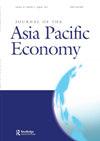Exploring precise poverty alleviation policies based on causal inference: a case study from China
IF 1.5
4区 经济学
Q3 ECONOMICS
引用次数: 0
Abstract
AbstractTo explore the effect of targeted poverty alleviation policies in Guangdong Province from the perspective of causal inference, this paper conducts quantitative research based on panel data of poverty-stricken counties in Guangdong Province from 2013 to 2020. Specifically, breakpoint regression is used to analyze the initial effect of the policy, instrumental variables are used to analyze the long-term effect of the policy implementation, and finally, the generalized comprehensive control method is used to make a comparative study. The results show that: (1) The targeted poverty alleviation policy in Guangdong Province has a remarkable effect on poverty reduction; (2) The effect of targeted poverty alleviation policy is still remarkable by comparing the implemented policy with the unimplemented one in Guangdong Province; (3) The improvement of market economic activity can effectively promote the increase of farmers’ personal net income in poor areas of Guangdong Province.Keywords: Breakpoint regressioncomparative evaluationeffect assessmentgeneralized integrated control methodinstrumental variables Author contributionsConceptualization, Qing Guo; methodology, Qing Guo; software and formal analysis Youyang Liu and Min Zhu; writing—original draft preparation, Qing Guo and Youyang Liu; writing—review and editing, Qing Guo, Youyang Liu and Min Zhu; supervision and funding acquisition, Qing Guo. All authors have read and agreed to the published version of the manuscript.Disclosure statementNo potential conflict of interest was reported by the author(s).Data availability statementThe data and estimation commands that support the findings of this paper are available on request from the first and corresponding authors.Additional informationFundingThis research is supported by the National Social Science Foundation (21CJL007); the Humanities and Social Science Project of China’s Ministry of Education (20YJC790036); the Natural Science Foundation of Guangdong Province (2020A1515010629); the Basic and Applied Basic Research Project of Guangzhou (202102021185).基于因果推理的精准扶贫政策探索——以中国为例
摘要为了从因果推理的角度探讨广东省精准扶贫政策的效果,本文基于2013 - 2020年广东省贫困县面板数据进行定量研究。具体而言,采用断点回归分析政策的初始效果,采用工具变量分析政策实施的长期效果,最后采用广义综合控制方法进行对比研究。结果表明:(1)广东省精准扶贫政策对减贫效果显著;(2)广东省实施与未实施的精准扶贫政策效果仍然显著;(3)市场经济活动的完善能有效促进广东省贫困地区农民个人净收入的增加。关键词:断点回归比较评价效果评价广义综合控制方法工具变量作者贡献概念化郭清方法论,清果;软件与形式分析;刘友阳,朱敏;写作—原稿准备,郭清、刘友阳;撰稿编辑:郭清、刘友阳、朱敏;监管和资金收购,清郭。所有作者都已阅读并同意稿件的出版版本。披露声明作者未报告潜在的利益冲突。数据可用性声明支持本文发现的数据和估计命令可根据第一作者和通讯作者的要求提供。本研究由国家社会科学基金(21CJL007)资助;教育部人文社会科学项目(20YJC790036);广东省自然科学基金(2020A1515010629);广州市基础与应用基础研究项目(202102021185);
本文章由计算机程序翻译,如有差异,请以英文原文为准。
求助全文
约1分钟内获得全文
求助全文
来源期刊

Journal of the Asia Pacific Economy
ECONOMICS-
CiteScore
3.70
自引率
7.10%
发文量
58
期刊介绍:
Journal of the Asia Pacific Economy (JAPE) is concerned primarily with the developing economies within Pacific Asia and South Asia. It aims to promote greater understanding of the complex factors that have influenced and continue to shape the transformation of the diverse economies in this region. Studies on developed countries will be considered only if they have implications for the developing countries in the region. The journal''s editorial policy is to maintain a sound balance between theoretical and empirical studies. JAPE publishes research papers in economics but also welcomes papers that deal with economic issues using a multi-disciplinary approach. Submissions may range from overviews spanning the region or parts of it, to papers with a detailed focus on particular issues facing individual countries. JAPE has a broad readership, which makes papers concerned with narrow and detailed technical matters inappropriate for inclusion. In addition, papers should not be simply one more application of a formal model or statistical technique used elsewhere. Authors should note that discussion of results must make sense intuitively, and relate to the institutional and historical context of the geographic area analyzed. We particularly ask authors to spell out the practical policy implications of their findings for governments and business. In addition to articles, JAPE publishes short notes, comments and book reviews. From time to time, it also publishes special issues on matters of great importance to economies in the Asia Pacific area.
 求助内容:
求助内容: 应助结果提醒方式:
应助结果提醒方式:


